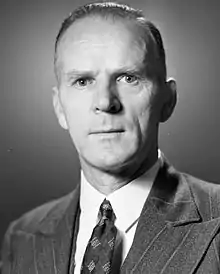Ernest Corbett
Ernest Bowyer Corbett (7 May 1898 – 15 June 1968) was a New Zealand National Party politician.
Ernest Corbett | |
|---|---|
 | |
| 27th Minister of Māori Affairs | |
| In office 13 December 1949 – 26 September 1957 | |
| Prime Minister | Sidney Holland Keith Holyoake |
| Preceded by | Peter Fraser |
| Succeeded by | Keith Holyoake |
| Member of the New Zealand Parliament for Egmont | |
| In office 1943 – 26 September 1957 | |
| Succeeded by | William Sheat |
| Personal details | |
| Born | 7 May 1898 Ōkato, New Zealand |
| Died | 15 June 1968 (aged 70) New Plymouth, New Zealand |
| Political party | National |
| Spouse(s) | Doris Eileen Sharp (m. 1923) |
| Children | Two sons |
Early life and family
Corbett was born in Ōkato in 1898; his father was William Corbett. His mother was descended from Thomas Hansen, who had come to New Zealand with Samuel Marsden in 1814 in the brig Active. He received his education at Puniho pa and at Okato state school. In 1922, he married Doris E. Sharp, the daughter of A. Sharp. He worked for the Post and Telegraph Department for six years, followed by four years in a dairy factory, and then as a dairy farmer.[1]
Public offices
| New Zealand Parliament | ||||
| Years | Term | Electorate | Party | |
| 1943–1946 | 27th | Egmont | National | |
| 1946–1949 | 28th | Egmont | National | |
| 1949–1951 | 29th | Egmont | National | |
| 1951–1954 | 30th | Egmont | National | |
| 1954–1957 | 31st | Egmont | National | |
Corbett was the director of the National Dairy Association for six years. He was with the Oxford Dairy Company for 26 years and the Dairy Insurance Company for 12 years. For 12 years, he was a warden for the Church of England.[1]
Corbett held the Egmont electorate from 1943 to 1957.[2] He was Minister of Māori Affairs, Minister of Lands and Minister of Forests in the First National Government.[3] As Māori Affairs Minister he worked closely with Māori statesman Āpirana Ngata, and spent much of his time implementing "Ngata’s policies".[4]
Corbett had a deep affection for the natural environment and was an honorary ranger for Egmont National Park. He was made a life member of the Royal Forest and Bird Protection Society of New Zealand. During his time as a cabinet minister, the National Parks Act 1952 was passed. During his time in office, some 1,200,000 acres (490,000 ha) were added to national parks. For his contributions, he was awarded the Loder Cup in 1958, an award given to those who have made "contributions to plant conservation work in New Zealand".[5]
Corbett fell ill and, according to Wilson (1985), retired at the end of the parliamentary term on 29 October 1957,[2] or, according to his biographer, in September 1957,[4] shortly before his government's defeat. He died on 15 June 1968.[4]
In April 2010 it was alleged by Muru Walters that in 1956 Corbett told the Māori All Blacks to deliberately lose to the Springboks "for the future of rugby"; however, several other players in the team contradict Walters' accusation and state Corbett never asked them to deliberately throw the game. The Māori team lost 37–0. This was followed by Walters calling for the government to apologise for the way it treated Māori rugby players.[6]
Notes
- Scholefield 1951, p. 52.
- Wilson 1985, p. 190.
- Wilson 1985.
- Butterworth, Graham. "Corbett, Ernest Bowyer". Dictionary of New Zealand Biography. Ministry for Culture and Heritage. Retrieved 14 April 2010.
- "All Loder Cup winners from 1929". Department of Conservation. Retrieved 23 January 2021.
- "Rugby: Maori told to throw match against Boks". The New Zealand Herald. 13 April 2010. Retrieved 14 April 2010.
References
- Scholefield, Guy (1951). Who's Who in New Zealand, 1951 (5th ed.). Wellington: A.H. & A.W. Reed.
- Wilson, James Oakley (1985) [First published in 1913]. New Zealand Parliamentary Record, 1840–1984 (4th ed.). Wellington: V.R. Ward, Govt. Printer. OCLC 154283103.
| New Zealand Parliament | ||
|---|---|---|
| Preceded by Charles Wilkinson |
Member of Parliament for Egmont 1943–1957 |
Succeeded by William Sheat |
| Political offices | ||
| Preceded by Peter Fraser |
Minister of Māori Affairs 1949–1957 |
Succeeded by Keith Holyoake |